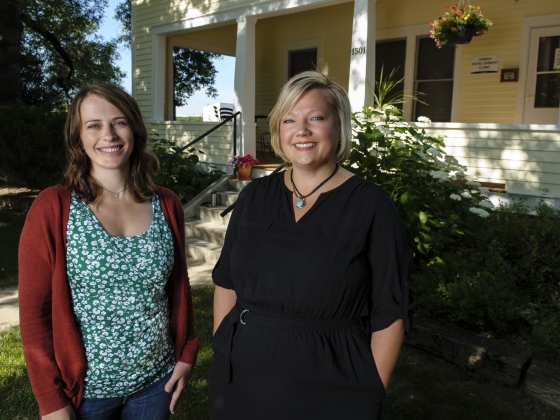MSU, local health department collaborate to provide more access to mental health care services
Wednesday Jul. 25th, 2018
Access to mental health care services is available to more individuals in the Gallatin Valley thanks to a grant from the Montana Healthcare Foundation and a partnership between Montana State University and the Gallatin City County Health Department.
With the grant, which is worth nearly $70,000, MSU counseling professors Anna Elliott and Rebecca Koltz from the MSU Department of Health and Human Development in the College of Education, Health and Human Development have partnered with the Gallatin City County Health Department’s Healthy Gallatin Home Visiting program. Through the collaboration, health department home visitors with the program may refer individuals and families to an MSU clinic for counseling services.
“Currently in the Gallatin Valley, there is a shortage of services for low-income residents to receive counseling services, so our grant aims to help attend to this gap,” Koltz said. “We hope that we can increase our ability to provide meaningful mental health services to an underserved population in the Gallatin Valley.”

The counseling services will be offered for a low cost through the Human Development Clinic, a community mental health agency that is affiliated with MSU's graduate counseling program. Counseling sessions offered through the clinic are staffed by MSU graduate counseling students who are supervised by licensed mental health professionals.
"Each year the graduate counseling students (at MSU) provide approximately 14,000 hours of free or low-cost counseling to the community,” Elliott said. “We want to increase our ability to offer mental health care to clients who may not be able to access services from other sources.”
There is no restriction to the number of counseling sessions participants may receive, said Koltz, who added that the client and counselor will collaboratively determine the number of sessions to best meet the client’s treatment plan goals.
Elliott said even though the sessions are offered at a low cost, individuals sometimes face logistical barriers to counseling. To try to help reduce those barriers, the Human Development Clinic will offer transportation to the clinic – which is located on South Third Avenue near the MSU campus – as well as child programming on site while the child’s or children’s caregiver/s are engaged in counseling sessions.
“Additionally, we are providing a range of services to tailor what each participant in this program would benefit from - individual, couples counseling, family counseling, and/or parent/child relationship counseling,” Elliott said.
According to Koltz, five to six interns work at the clinic, and in addition, she and Elliott are hoping to hire a post-master's intern who could also provide addictions counseling at the clinic.
Koltz and Elliott hope the grant and collaboration with the Gallatin City County Health Department will provide benefits for both the clients and the MSU graduate counseling students.
“We hope that we can increase our ability to provide meaningful mental health services to an underserved population in the Gallatin Valley,” Elliott said. “We also hope that this collaboration will provide an intensive training opportunity for our counseling interns, increasing their exposure to working with higher-need clients so that they can serve a range of clients in our community upon graduation.”
“The College of Education, Health and Human Development is committed to integrating community services with our teaching and research missions, consistent with being a land-grant university,” said Alison Harmon, dean of the college. “This new project is a great example of serving the community while also serving our students and adding to the country’s knowledge base.”
In additional to the new referral program, the Human Development Clinic offers counseling services upon request on a sliding fee scale for individuals and families in the Gallatin Valley. To receive a free, confidential beginning session, individuals are invited to call the Human Development Clinic at 406-994-4113.
| Tweet |